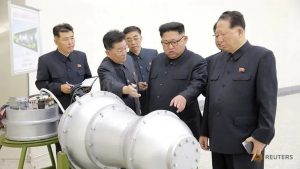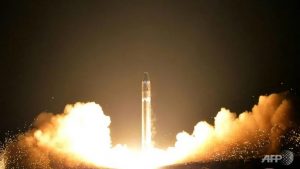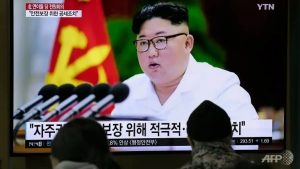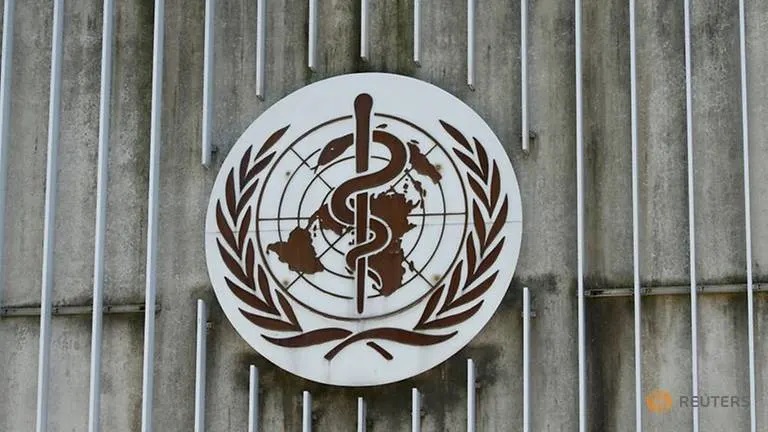The value of nuclear missiles to North Korea is very obvious, and it is surprising that US President Donald Trump offered so little for them, says Professor Robert E Kelly.

FILE PHOTO: North Korean leader Kim Jong Un provides guidance with Ri Hong Sop (2nd L) and Hong Sung Mu (R) on a nuclear weapons programme in this undated photo released by North Korea’s Korean Central News Agency (KCNA) in Pyongyang September 3, 2017.
BUSAN: This week, North Korean supreme leader Kim Jong Un stated that nuclear deterrence insures there will never be another war against North Korea. This has been treated in the regional media as a breakthrough moment – no less than the leader of North Korea has now stated that war in Korea is now unthinkable.
It is true that Kim himself has rarely spoken so bluntly, but these comments cap what the North Koreans have been signalling for a long time.
While North Korea has talked about nuclear disarmament and signed various non-binding statements for decades, it has never taken concrete action to roll back its program. It has frozen it occasionally, but even then, in the 1990s, there was wide suspicion it was cheating.
Otherwise the North has chugged along in pursuit of nukes for four decades. Its slow and steady progress was never really affected by all the various efforts of outsiders to stop its nuclearisation.
ACHIEVING ITS DETERRENCE GOAL
This long project reached fruition in 2017. That year the North detonated a warhead estimated of being half a megaton, although there is much debate over the yield of the North’s weapons and Pyongyang has told us nothing about them.

North Korea says it can now hit anywhere in the United States with a nuclear tipped missile, but analysts think this ability remains some way off
In 2017, the North also completed an intercontinental ballistic missile with the range to strike all of the United States (US).
With a nuclear warhead atop such a missile, the North achieved direct nuclear deterrence against the US. Previously, the North deterred US action against it by threatening America’s regional allies.
But this was always a half-measure compared to threatening the US homeland directly. As the US has long been North Korea’s greatest opponent, and because the US has occasionally threatened to strike North Korea, Pyongyang has long wanted long-range nuclear missiles.
Such weapons would preclude the US ever attacking the North, because the North could devastate several US cities in response.
Such deterrence helped keep the peace during the Cold War. The Soviets and Americans were so scared of a nuclear exchange that they exercised caution in how they interacted. North Korea expects the same, and it is highly likely now that the US will never strike.
This is why Kim says war will not occur; he is almost certainly correct.
This has been clear since 2017. US President Donald Trump briefly tried to talk around this. He threatened North Korea with “fire and fury”, and his White House threatened a “bloody nose” strike on North Korea to force it to negotiate.
But this was always hugely risky. The South Korean population opposed conflict, and Trump never moved the needed assets into the theater to really prosecute a war. By 2018, Trump had pivoted to negotiations.
Those negotiations resulted in very little. Trump was unwilling to offer anything to Kim remotely commensurate to the value of nuclear missiles to the North.
Unsurprisingly, North Korea has not surrendered even a single missile or warhead since Trump’s détente effort started.
For all the flashy optics, little has changed empirically on the ground in Korea. We are all adapting, whether we like it or not, to the reality of North Korea as a permanent nuclear weapons state. Kim’s speech only formalised what has been clear for a while.
The value of nuclear missiles to the North is very obvious, and it is surprising that Trump offered so little for them – sanctions relief and development aid since North Korea is poor and backward.
LIVING WITH A NUCLEARISED NORTH
The North is locked in an existential stand-off with the far wealthier and more powerful South, supported by the US. North Korea’s security environment is punishing, so it makes sense to pursue doomsday weapons, no matter how much the rest of us wish they did not have them.
So what can be done about this scenario? Going forward, I see three large issues for the world’s nuclear engagement with North Korea.

North Korean leader Kim Jong Un in December declared an end to North Korea’s moratoriums on nuclear and intercontinental ballistic missile tests
First, nuclear deterrence does not require hundreds of missiles and warheads. The nuclear destruction of even just one city is likely enough to prevent the US or China from acting against the North.
Hence, North Korea might give up some of its weapons if it is offered a lot for them. They will not give them all up, but they might be willing to give up some.
Second, North Korea needs to be pulled into some kind of nuclear safety, transparency, and non-proliferation framework. North Korea today is not a part of either the Non-Proliferation Treaty or the International Atomic Energy Agency.
Its nuclear program is unmonitored by the rest of the world. We have little hard information about their nuclear plants and weapons – dimensions, numbers or technology. This is bound to create paranoia in the rest of the world.
During the Cold War, the US and Soviets shared nuclear information in order to reduce anxiety. Information-sharing inhibited hawkish, worst-case scenario planning that huge build-ups were necessary because the other side might always have more. Transparency reduced spirals of action and reaction.
But North Korea has not been transparent about its nuclear weapons so far. Without inspectors and some internationally agreed rules on its nukes, the rest of the world is bound to draw the worst possible conclusions about its programme, making tensions even worse.
Similarly, it is not hard to imagine inadequate North Korean nuclear safety and the possibility of a Chernobyl-style meltdown at a North Korean nuclear plant. North Korea is poor and technologically backward. It would be no surprise if it cut safety corners in its rapid drive to nuclearise.
It is also not hard to imagine cash-poor North Korea proliferating technologies for money. We need to pull the North into some kind of oversight framework.
Third, the world needs a policy response to North Korea going fully nuclear.
Do we just adapt and then signal to other possible nuclear states that once they acquire these weapons, we will just accept it? Do we sanction North Korea even more? Do we pursue even more intrusive methods, such as pursuing North Korean money in Chinese banks – at the risk of worsening relations with Beijing – or stopping North Korean ships on the high seas – at the risk of shooting incidents on ships? These are thorny questions no one has really thought through.
North Korea is now a nuclear weapons state, whether we like it or not. Kim Jong Un just reminded us, and no one really knows what we should do – but at least for now, the confirmation of a non-war coming from the man himself, is somewhat relieving.
Robert Kelly is Professor at the Department of Political Science and Diplomacy at Pusan National University.

